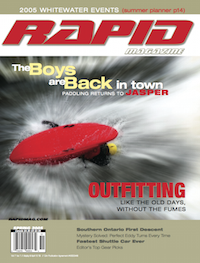Though we may often take the vastness of our country for granted, I expect that deep down most of us are proud of our great landscape and the role it has played in shaping the history of our country. This pride shows itself as a fierce love for free flowing rivers, nearendless mountain ranges, and the vast boreal wilderness. And while it may be true that we are better positioned than others to gain a meaningful knowledge of the shape of the earth, it is a knowledge that still has to be actively sought. In Canada, a vague and passive appreciation of the land is easy, too easy.
From the seats of our little boats, we have reduced our rivers to a short section between put-in and take- out, a linked series of playspots and ledges. For us, a river becomes a familiar, sometimes memorized sequence of moves that hints at adventure. It is a snapshot, like a photo of a person that in no way indicates health, happiness or history. This limited knowledge weakens us as paddlers and members of a community. Who are we to speak for a river if we only know eight kilometres of it?
Sliding into the water at a put-in I can’t help but wonder what lies upstream, or where the river goes when it flows around a bend and out of sight at the take- out. Do Ottawa River paddlers know anything of the roaring Culbute Rapids, or the many drops at the Swisha? What about the mountainous waves of Clarke’s Folly in spring flood?
To really understand rivers requires commitment, time and even intimacy. To understand a river is to understand something about all rivers, and to understand rivers is to understand geography.
At one time I pursued an encyclopedic knowledge of rivers — wavelengths, gravel bar formation, erosion, particle capacity. This was an exercise in frustration. I came to see that, without connection to whole rivers, these facts are meaningless.
It was not until I explored my own river — not my local whitewater run, but the stream that runs through the culvert down my road — that I began to understand rivers, and therefore geography, in the broadest sense.
My stream is unremarkable in every way except that it is my own. It shapes the landscape I look onto every morning when I wake up and defines the place where I live. If we don’t really know where we live, then it doesn’t matter where we live.
Understanding local streams matters. We need to know our rivers to care for our rivers. News of dams on the Magpie or the Churchill, or a hundred other rivers, means more than the loss of whitewater runs, mere places to play. Dams portend a drastic alteration of geography, and with it an erosion of the knowledge that is our birthright. In backing up the water, dams dry up our sense of place.
Our predecessors travelled without maps and knew their rivers top to bottom. They understood flow through the seasons, the length, breadth and character of a river. Compare this to playboaters who have a bottomless depth of knowledge for a handful of features on a river, yet are oblivious to what lies 100 metres upstream or down.
It’s an oblivion that has to be recognized. Paddlers are the chosen ones. In a world of bulldozed suburbia we view the world with wet hands and water in our eyes. We feel the connection to the Earth through the grip of the current. We must not ignore the geography that created that current and the geography that the current creates.
Paddle past the take-out.
Jeff Jackson is a professor of the outdoor program at Algonquin College in Pembroke, Ont.




